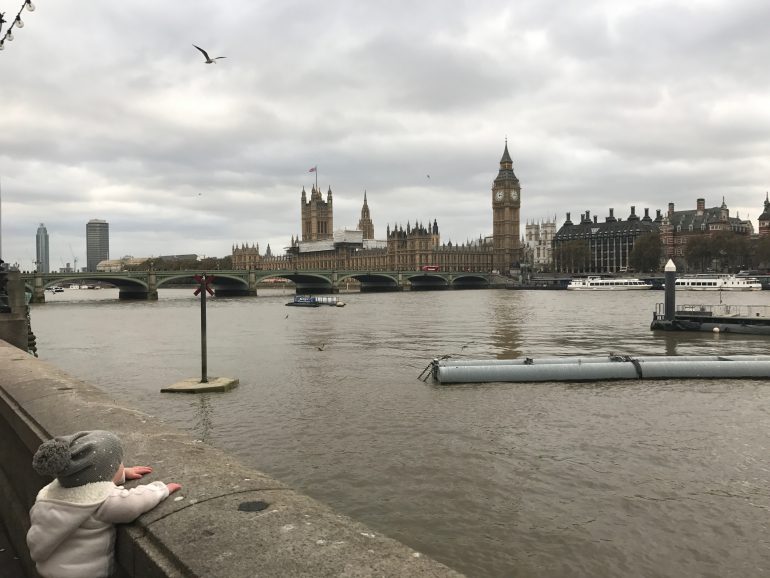LONDON — Not even the Atlantic Ocean could separate American students studying abroad in London from the 2016 presidential election.
In a country with a history of sharing intelligence and having a “special relationship” with the United States, the historic election followed California native Betsy Roy wherever she went.
“Everyone just brings it up here,” she said. “Random people ask me about it. It’s kind of constant, I’d say.”
Americans, it turns out, were not the only ones consumed by the U.S. presidential election. Intense British interest in the battle for the White House gave American students studying abroad an added bit of curriculum this year: explaining to their European hosts what was happening across the pond.
The United Kingdom is the most popular destination for Americans studying abroad, according to a 2015 report published by the Institute of International Education in partnership with the U.S. Department of State. In the 2013-2014 academic year, about 38,000 U.S. students flocked to the United Kingdom.
Roy, a Brown University student spending this semester at Queen Mary University of London, found it easy to keep up with the election every day because of the overseas fascination.
“People are just…like frightened and just confused, just wondering how Trump came to be,” she said, adding she found herself explaining the political divisions in the United States more often than not. “It just feels like a different way of getting overloaded by the election.”
Chrissy Kennedy, a University of Maryland junior studying government and politics, studied at the University of London in the spring while her friends at home voted in the primaries.
“Whenever anyone found out that we were Americans,” the Bethesda resident said, “one of the first things was always, ‘What do you feel about (Donald) Trump? The election’s crazy, what’s going on?’”
She is back in Maryland now and cast her ballot for Democratic nominee Hillary Clinton. She said she didn’t send an absentee ballot last spring during the primary because she didn’t feel strongly enough about any of the candidates.
But that didn’t stop the questions from her British friends.
“They kind of found it funny, mostly,” she said. “They were kind of laughing, like ‘How did you end up with Trump?’ …And then some took it more seriously, and said, ‘You know, as a country that’s very close to America and has ally ties with America, we don’t necessarily want to have to deal with Trump for the next four years.’”
Violet Fortier, a Doylestown, Pennsylvania, native and Mount Holyoke College student also is studying at Queen Mary University of London. She has found a group of fellow Americans she talks to about U.S. politics. They watched every debate together despite the five-hour time difference, often staying up until 2 a.m., but Fortier finds election talk tiring.
“It’s less stressful to be over here for sure,” she said. “I’m so, like, ‘Oh my god, can we not talk about the election?’ Like I’m still sick of it, but it definitely would’ve been worse in the U.S.”
She said people are “constantly bringing up the last ridiculous thing Trump said,” and that there’s a mixture of confusion and fear about the results. People consistently ask her why everyone in the U.S. “hates Hillary Clinton.”
Fortier voted absentee for Clinton, and she said she tries not to speak for the entire country when she answers.
Kennedy said no London local she spoke to was passionate about either candidate, and viewed Clinton as “better than Trump,” but didn’t necessarily like her.
Kennedy lived in international housing with people from all over the world, and found they were paying close attention to the election.
“I could never really ask them about, you know, the politics in their country because I didn’t know,” she said, “but almost everyone kind of knew what the political structure was in America, knew who the candidates were, knew what their policies were.”
Her twin sister, Emmy Kennedy, who also is a University of Maryland student and spent the spring semester at University College London, did not vote absentee in the primaries because she was constantly traveling. She said she would have voted for Marco Rubio in the Republican primary, and in the general election voted for Libertarian candidate Gary Johnson.
Emmy Kennedy said she fielded election questions every day, and often struggled to answer them.
“Most of the questions were about Trump and how we could let him win the primaries, and how he could think he could get away with all these ridiculous ideas and policies he’s trying to get,” she said. “I didn’t have much of an answer because I’m still kind of baffled by it.”
Emmy Kennedy added the people she spoke to last spring weren’t necessarily worried and were making fun of the United States.
Brown student Roy finds that amusement has subsided in London.
“I think like a month ago people were just like laughing and now they’re worried,” she said.
Chrissy Kennedy said the experience abroad taught her how important perception of the United States cross the world was.
“Coming back, I just got this new sense of importance that I not only have to vote for someone that I think is good for America,” she said, “but I need to vote for someone who the rest of the world will see as a good leader and will portray America in a good light.”
Though Fortier was spending Election Day in Vienna, Austria, while U.S. citizens went to the polls, she — and the rest of the world — were watching anxiously to see who she would be coming home to.
“It’ll be really weird,” she said about the prospect of a new president. “I’m really nervous.”

